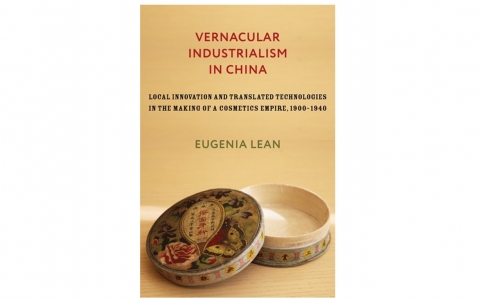december, 2020
2dec4:00 pm- 5:00 pmNew Books in the Arts & Sciences Celebrating Recent Work by Eugenia Lean
Event Details
New Books in the Arts & Sciences: Celebrating Recent Work by Eugenia Lean
Event Details
Vernacular Industrialism in China: Local Innovation and Translated Technologies in the Making of a Cosmetics Empire, 1900–1940
By: Eugenia Lean
In early twentieth-century China, Chen Diexian (1879–1940) was a maverick entrepreneur—at once a prolific man of letters and captain of industry, a magazine editor and cosmetics magnate. He tinkered with chemistry in his private studio, used local cuttlefish to source magnesium carbonate, and published manufacturing tips in how-to columns. In a rapidly changing society, Chen copied foreign technologies and translated manufacturing processes from abroad to produce adaptations of global commodities that bested foreign brands. Engaging in the worlds of journalism, industry, and commerce, he drew on literati practices associated with late-imperial elites but deployed them in novel ways within a culture of educated tinkering that generated industrial innovation.
Through the lens of Chen’s career, Eugenia Lean explores how unlikely individuals devised unconventional, homegrown approaches to industry and science in early twentieth-century China. She contends that Chen’s activities exemplify “vernacular industrialism,” the pursuit of industry and science outside of conventional venues, often involving ad hoc forms of knowledge and material work. Lean shows how vernacular industrialists accessed worldwide circuits of law and science and experimented with local and global processes of manufacturing to navigate, innovate, and compete in global capitalism. In doing so, they presaged the approach that has helped fuel China’s economic ascent in the twenty-first century. Rather than conventional narratives that depict China as belatedly borrowing from Western technology, Vernacular Industrialism in China offers a new understanding of industrialization, going beyond material factors to show the central role of culture and knowledge production in technological and industrial change.
Click here to register via Zoom.
Please email disability@columbia.edu to request disability accommodations. Advance notice is necessary to arrange for some accessibility needs.
About the Author:
Eugenia Lean is Professor of Chinese History at Columbia University. She is the author of Public Passions: The Trial of Shi Jianqiao and the Rise of Popular Sympathy in Republican China and, most recently, Vernacular Industrialism in China: Local Innovation and Translated Technologies in the Making of a Cosmetics Empire, 1900–1940, among other published works.
About the Speakers:
Deborah Coen is Professor of the History of Science and Medicine at Yale University. Among her publications, she has authored Vienna in the Age of Uncertainty: Science, Liberalism, and Private Life; The Earthquake Observers: Disaster Science from Lisbon to Richter; and, most recently, Climate in Motion: Science, Empire, and the Problem of Scale.
Jing Tsu is John M. Schiff Professor of East Asian Languages and Literatures at Yale University. She is the author of Failure, Nationalism, and Literature: The Making of Modern Chinese Identity, 1895–1937; and Sound and Script in Chinese Diaspora, among other published works.
Kavita Sivaramakrishnan is Associate Professor of Sociomedical Sciences at Columbia University. She is the author of As the World Ages: Rethinking a Demographic Crisis and Old Potions, New Bottles: Recasting Indigenous Medicine in Colonial Punjab 1850–1945, among other publications.
Wei Shang is Du Family Professor of Chinese Culture at Columbia University. Among his published works, he has authored “Rulin waishi” and Cultural Transformation in Late Imperial China and, most recently, Writing on Landmarks: From Yellow Crane Tower to Phoenix Pavilion.
Time
(Wednesday) 4:00 pm - 5:00 pm


